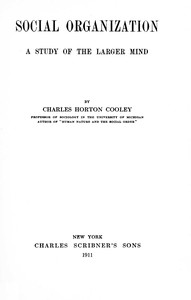| Author |
Cooley, Charles Horton, 1864-1929 |
| Title |
Social organization : A study of the larger mind
|
| Original Publication |
New York: Charles Scribner's sons, 1909, reprint 1911.
|
| Credits |
Bob Taylor, Aaron Adrignola and the Online Distributed Proofreading Team at https://www.pgdp.net (This file was produced from images generously made available by The Internet Archive)
|
| Summary |
"Social Organization: A Study of the Larger Mind" by Charles Horton Cooley is a scholarly publication written in the early 20th century. This work focuses on the relationship between the individual mind and social dynamics, emphasizing how personal consciousness is shaped by social interactions and relationships. It delves into the intricacies of social organization, collective consciousness, and the interplay between individual thoughts and societal influences. The opening of the book outlines Cooley's perspective on social organization, positing that the mind functions as an organic whole influenced by interpersonal relations. He highlights the interconnectedness of self-consciousness and social consciousness, arguing that they emerge simultaneously. Cooley also critiques traditional views that prioritize individual self-awareness, instead advocating for a vision of the mind as fundamentally communal. His introduction sets the stage for a deeper exploration of social ideals, communication, and the moral fabric of society, positing that human nature and social structures evolve together as integrated components of social life. (This is an automatically generated summary.)
|
| Language |
English |
| LoC Class |
HM: Social sciences: Sociology
|
| Subject |
Sociology
|
| Subject |
Social psychology
|
| Category |
Text |
| EBook-No. |
72636 |
| Release Date |
Jan 5, 2024 |
| Copyright Status |
Public domain in the USA. |
| Downloads |
136 downloads in the last 30 days. |
|
Project Gutenberg eBooks are always free!
|

